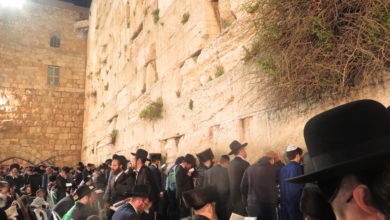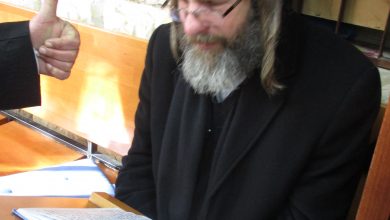THREE STORIES FROM AN OLD BOOK

THREE STORIES FROM AN OLD BOOK
The city of Ostrow played a prominent role in Jewish
history. It had a long and distinguished record as a
place where Jews lived and prospered. As would be
expected, many prominent Rabbis and communal
leaders are part of Ostrow's history. Perhaps the
best known of these inhabitants was the great Talmid
Chochom and holy Tzaddik, the Maharsho. When the
Rebbe visited Ostrow, the local people told him
about a very old and amazing book. In this book, the
city elders of Ostrow had recorded the outstanding
incidents of the past which either took place in
Ostrow or which happened to one of its leading
citizens. They told him there were some very
amazing and wonderful stories in this book and
anyone who wanted to read them had to pay a
certain large coin for each story. The Rebbe paid the
community official three large coins and was
allowed to read three of these amazing stories. All
three had to do with the Maharsho and the miracles
which he performed. The Rebbe later told these
stories to his chassidim. And told them to his
daughter, when she was ill, as a Seguloh for her
healing.
The Maharsho Honors a Jewish
King
Before taking the position as Rabbi of Ostrow, the
Maharsho was the Rabbi of another Jewish
community. There, he spent his time studying and
teaching Torah to young men in the Yeshiva. In a
nearby community, not far from the Maharsho, lived
the Chief Rabbi of the province. All the local rabbis
were under his direction. Every so often they would
gather in his house and discuss any Halachic
question they had. In all these discussions, the Chief
Rabbi's opinion was always the final word on the
matter. As the Rabbi of his city, the Maharsho was
also required to accept the authority of this Chief
Rabbi of the whole province. But, because he was
always involved in Torah study, day and night, he
never joined the gathering in the Chief Rabbi's
house. For his part, the Chief Rabbi never saw this as
an act of disrespect. He always assumed the
Maharsho was just too busy with studying and
teaching, and didn't have the time to come to him.
But, because the Chief Rabbi wanted to meet him, he
decided that he would travel to the Maharsho's city
where he felt certain they would be able to get
together.
When the Chief Rabbi arrived in the Maharsho's city,
the local inhabitants came out to greet him. The
honorable welcome he received was most
appropriate for someone of his stature and position.
The only person the Chief Rabbi did not see at the
welcoming was the person he wanted to see most.
The Chief Rabbi wondered about this. But again he
assumed that the Maharsho, because of his great
3
devotion to the Torah, just couldn't take the time off
to come out and greet him. I’ll just have to go to see
him, the Chief Rabbi decided.
When the Chief Rabbi entered the shul where the
Maharsho studied and taught, the Maharsho took no
notice of him. He went on with his teaching, not
bothering to welcome the distinguished guest.
Just then, a tall, distinguished looking teenage boy
walked in to the shul. The Maharsho jumped up from
where he was sitting and ran over to him. He greeted
the teenager warmly and spent a long time talking to
him, showing him a great deal of respect. As this
was happening, the Chief Rabbi stood on the side
with no one paying any attention to him. Watching
the Maharsho talking to the teenager, the Chief
Rabbi became angrier and angrier.
When he couldn't control himself any longer, the
Chief Rabbi stormed over to where the Maharsho
was talking with the boy and introduced himself. “In
the beginning, when you failed to come to my house
with all the other Rabbis, I assumed it was because
you didn't want to interrupt your Torah study. Then,
when you didn't come out to greet me with the other
people and didn't even notice me when I walked in
here, again I saw it as a result of your total
preoccupation with serving Hashem. I always
assumed your motives were correct and that you
were not acting this way out of disrespect. But when
this teenager walked in and I saw the way you
treated him, I realized how wrong I had been. Now I
see, stormed the Chief Rabbi, that it's not true. You
do interrupt your Torah study! Look at how you
spent so much time talking to him!”
After patiently listening to the Chief Rabbi, the
Maharsho called him over to the side and gave him a
shocking reply. “Soon enough you will understand
why I treated the teenager the way I did. In two short
hours he will be killed!”
The Chief Rabbi refused to accept the Maharsho's
answer. He didn't believe it. He approached the
teenage boy and began talking to him. The Chief
Rabbi planned to keep the boy in conversation for
two hours so that he could prove the Maharsho
wrong. The Chief Rabbi and the teenager walked out
the shul and down the street. The Chief Rabbi did
not take his eyes off him. Not long before the two
hours were up, the two of them entered a park. They
were talking together when suddenly, without
warning; the young boy slumped over and fell to the
ground. A gentile landowner had been hunting in the
park. He had aimed his bow at a bird, but instead of
hitting his mark, the arrow struck the teenage boy in
the heart. Less than two hours after the Maharsho
had predicted it, he was dead.
The Chief Rabbi could not believe it. He ran to the
Maharsho's shul to ask him for an explanation. But
the minute he entered, the Maharsho called out to
him: “What did you do? It's all your fault! Because
of you, soon they'll be bringing another dead person
from the city.” As soon as the Maharsho finished
speaking, they could hear people outside crying. A
dead man was being carried through the streets.
“What's that?” the terrified Chief Rabbi wanted to
know. “I’ll explain it to you, so that you'll
understand a little of what has happened here,” the
Maharsho said.
“This teenage boy who came into the shul had the
same soul as Achov, one of the kings of Israel. This
is why I showed him so much respect. And, because
he had the same soul, this teenager was destined to
suffer an untimely death, just like Achov. This had
already been decreed at the moment of this boy's
birth. The exact time and place had been determined
and the angel of death had already been assigned.
When the time came for this boy to leave this world,
the angel of death waited for him in the place he was
supposed to die. But, you prevented him from going
there! Because of this, the angel of death had to take
the life of someone else. So you see, it was only
because you delayed the teenager, by talking to him,
that he was killed by the gentile hunter. And the dead
person brought from the city, he was killed by the
angel of death who was waiting to kill the boy. You
will now have to repent for this. It was your fault this
other person was killed.”
When the Chief Rabbi heard this, he fell at the
Maharsho's feet and begged him for forgiveness. He
pleaded with the Maharsho to show him what he had
to do in order to repent. “To repent,” the Maharsho
told him, “you will have to give up your position as
Chief Rabbi and take a job as a wagon driver.” The
Chief Rabbi knew that what the Maharsho told him
was correct. He gave up his position and became a
simple wagon driver so that he could repent for his
sin.









